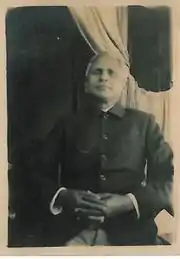Jadunath Sinha
Jadunath Sinha (1892 – 10 August 1978) was an Indian philosopher, writer and religious seeker.
Jadunath Sinha | |
|---|---|
 Jadunath Sinha | |
| Native name | যদুনাথ সিংহ |
| Born | Jadunath Sinha 1892 Kurumgram, Birbhum, Bengal Presidency, British India (Now West Bengal,India) |
| Died | 10 August 1978 |
| Occupation | Philosopher, writer, religious seeker |
| Language | Bengali, English |
| Nationality | Indian |
| Alma mater | University of Calcutta |
| Notable works | A manual of ethics, Indian psychology, A history of Indian philosophy, Indian Philosophy |
| Notable awards | Philip Samuel Smith Prize, Clint Memorial Prize, Griffith Prize (CU), Mouat Medal[1] |
Early life
Jadunath Sinha was born in Kurumgram in Birbhum, West Bengal in 1892. Later he lived in Murshidabad and Kolkata (then Calcutta). Jadunath Sinha came from a Shakta family. So, Sinha had spiritual experiences throughout his life. He followed both classical tantra and emotional Shakta bhakti, with a philosophical position of Shakta universalism.[2]
Academic career
Jadunath Sinha had passed B.A., Honours in Philosophy in 1915 from the Calcutta University and simultaneously bagging the Philip Samuel Smith Prize and the Clint Memorial Prize. Subsequently, he passed the M.A. on Philosophy from the Calcutta University in 1917. He did his PhD from the Calcutta University in 1934. He went on to become a versatile writer of Philosophy, Psychology etc. which were published by famous publishers. Two of his books were published by M/s. Kegan Paul of London. Dr. Sinha being the most original philosopher of Hinduism and Indian philosophy, psychology, etc. is still revered by the students of philosophy. He went into religion in the latter part of his life.
Sinha has been cited as one of the early contributors to the field of Indian psychology that began to emerge more strongly in the 21st century.
Controversy with Radhakrishnan
In the January 1929 issue of Modern Review, the Bengali philosopher Jadunath Sinha made the sensational claim that parts of his doctoral thesis, Indian Psychology of Perception, published in 1925, were copied by his teacher Sarvepalli Radhakrishnan into his book Indian Philosophy II, published in 1927.[3][4][5][6] The controversy continued into the February, March and April issues of the magazine.[7] In August 1929, Sinha filed a case in the Calcutta High Court, against Dr. Sarvepalli Radhakrishnan for infringement of his copyrights. Sinha claimed damages for Rs 20,000.[8][note 1] Radhakrishnan denied these claims and pointed out that manuscript of his book had been sent to publisher in 1924, but it was published after 3 years as the General Editor Muirhead was in the US.[9] Radhakrishnan counter-sued for defamation of character, demanding Rs 100,000 from Sinha and the editor of Modern Review, Ramananda Chattopadhyay.[7] Sinha's case was strong as many of his articles were already published.[10][note 2] However, the parties found the cost of litigation very high.
Henceforth the member of Bengal Legislative Council from Calcutta University, Syama Prasad Mookerjee mediated between them to settle the issue out of court. The suits were settled in May 1933, the terms of the settlement were not disclosed and the allegations made in the pleadings were withdrawn.[9]
Notable works
- Indian Psychology Perception (1934), page: 400[11]
- A Manual Of Ethics (1962)
- Indian psychology (1934) ISBN 9788120801653 Publisher: Motilal Banarsidass, pg 512
- A History of Indian Philosophy, Volume 1, Sinha Publishing House, 1956, 912 pages[12]
- History Of Indian Philosophy(1930) vol 2, Publisher: London Macmillan and co. limited
- Outline Of Indian Philosophy, New Central Book Agency, 1998 ISBN 9788173812033, 480 pages[13]
- The Philosophy of Vijnanabikshu, Sinha Publishing House, 1976, pg:73
Note
- Then in the first half of the month of August 1929, Prof Jadunath Sinha sued , claiming Rs.20,000/- as damages. Sometime in the first week of September 1929, Radhakrishnan filed a counter libel suit against Jadunath Sinha and Shri Ramananda Chattopadhyay demanding Rs.1,00,000/-. Probably Radhakrishnan thought that attack was the best defence!
- Dr. Radhakrishnan had published another book titled "The Vedanta according to Sankara and Ramanuja" in 1928, which was actually a reprint of Chapters 8 & 9 of his book "Indian Philosophy Vol. II." That book also had extensive pirated paragraphs from Prof. Jadunath Sinha's Premchand Roychand Studentship thesis. Luckily for Prof. Jadunath Sinha, he had published extracts from those two parts of his Premchand Roychand Studentship thesis in the Meerut College Magazines of 1924 and 1926.
References
- "Copy... and paste: Plagiarism in literature over the years". Karthik Venkatesh. LiveMint. 17 February 2018. Retrieved 15 May 2020.
- "A Biography of Jadunath Sinha". om-guru.com. Retrieved 7 September 2018.
- Robert Neil Minor (1 January 1987). Radhakrishnan: A Religious Biography. SUNY Press. pp. 33–37. ISBN 978-0-88706-554-5. Retrieved 17 May 2020.
- "Why Teachers' Day in India is a sham". Dailyo. 6 September 2017. Retrieved 10 September 2017.
- "সম্পাদক সমীপেষু: জেনে রাখা ভাল". Anandabazar Patrika (in Bengali). Retrieved 7 September 2018.
- Aich, Utpal (5 September 2016). "Dr. Sarvepalli Radhakrishnan: The teacher who stole from his student's thesis". Round Table India.
- "S. Radhakrishnan: Philosopher, President, Plagiarizer? | Madras Courier". Madras Courier. 20 October 2016. Retrieved 8 September 2018.
- "A Biography of Jadunath Sinha". www.om-guru.com. Retrieved 7 September 2018.
- K. Satchidananda Murty, Ashok Vohra (1990). Radhakrishnan: His Life and Ideas. SUNY Press. pp. 31–33. ISBN 9780791403433.
- "Subcontinental plagiarism". Idrees Bakhtiar. Dawn. 14 August 2012. Retrieved 16 May 2020.
- Jadunath Sinha (1934). "Indian Psychology Perception". Nature. 135 (3404): 132. Bibcode:1935Natur.135R.132.. doi:10.1038/135132d0. PMC 5159082.
- Sinha, Jadunath (1956). A History of Indian Philosophy. Sinha Publishing House.
- Sinha, Jadunath (1998). Outline of Indian Philosophy. New Central Book Agency. ISBN 9788173812033.